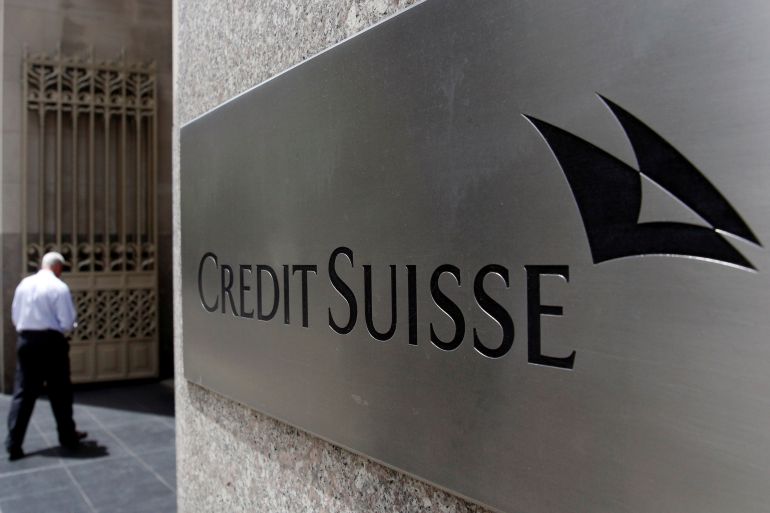Credit Suisse to borrow up to $54bn amid banking crisis fears
Announcement comes after Zurich-based bank’s shares lost more than one-quarter of their value in a day.

Credit Suisse will borrow up to 50 billion Swiss francs ($54bn) from Switzerland’s central bank to shore up confidence in the troubled lender amid concerns about the health of the global banking system after the collapse of Silicon Valley Bank (SVB).
Credit Suisse said on Thursday the loan from the Swiss National Bank (SNB) would support the bank’s core businesses as it took the “necessary steps to create a simpler and more focused bank built around client needs”.
The Zurich-based lender said it would also buy back about $3bn of its debt.
“This additional liquidity would support Credit Suisse’s core businesses and clients as Credit Suisse takes the necessary steps to create a simpler and more focused bank built around client needs,” the bank said.
Credit Suisse’s shares soared 30 percent on Thursday after the announcement, bolstering confidence as fears about the banking system moved from the United States to Europe.
The announcement comes after Credit Suisse shares lost more than one-quarter of their value amid persistent market jitters in the wake of SVB’s collapse – the biggest bank failure in the United States since 2008.
The stock rout came after the chair of Saudi National Bank, Credit Suisse’s biggest shareholder, said in a television interview on Wednesday the lender would “absolutely not” increase its stake in the bank.
The banking turmoil has cast a shadow over Thursday’s meeting of the European Central Bank. Before the chaos erupted, ECB head Christine Lagarde had said it was “very likely” the bank would make a large, half-percentage point rate increase to tackle stubbornly high inflation.
In a statement on Thursday, Credit Suisse Chief Executive Ulrich Körner said the measures “demonstrate decisive action to strengthen Credit Suisse as we continue our strategic transformation to deliver value to our clients and other stakeholders”.
“We thank the SNB and FINMA [Swiss Financial Market Supervisory Authority] as we execute our strategic transformation,” Körner said. “My team and I are resolved to move forward rapidly to deliver a simpler and more focused bank built around client needs.”
The SNB and FINMA on Wednesday said they stood ready to make liquidity available to Credit Suisse if needed, although the bank’s capital and liquidity levels met regulatory requirements.
“The Swiss Central Bank statement was a good statement, very nuanced and carefully worded, showing support for the bank and a willingness to do ‘whatever it takes’,” Professor Barbara Casu, of Bayes Business School, told Al Jazeera.
Credit Suisse’s woes have added to a selloff of bank stocks in the US, Europe and Asia, sparked by the implosion of SVB and subsequent failures of cryptocurrency-focused lenders Signature Bank and Silvergate Capital.
‘More troubles than surmised’
Credit Suisse was beset by problems long before the US bank failures. The announcement on Thursday was the latest effort to restore the bank’s tarnished image following a raft of scandals in recent years, including the hiring of private detectives to spy on employees and facilitating corrupt loans in Mozambique.
In October, Credit Suisse’s stock price hit a record low after a memo from Körner, which sought to assure employees about the bank’s future, inadvertently sparked rumours the lender could be on the brink of collapse.
William Lee, chief economist at the Milken Institute in the US, said Saudi Arabia’s decision was indicative of deeper troubles at Credit Suisse.
“The Saudis think Credit Suisse may have more troubles than was surmised and their decision has put an emphasis on investors having to investigate the soundness of large global banks,” he told Al Jazeera.
Casu also said Credit Suisse “is not” SVB.
“It is a large, diversified bank. It has been troubled in recent months, but the problems are more varied,” she added.